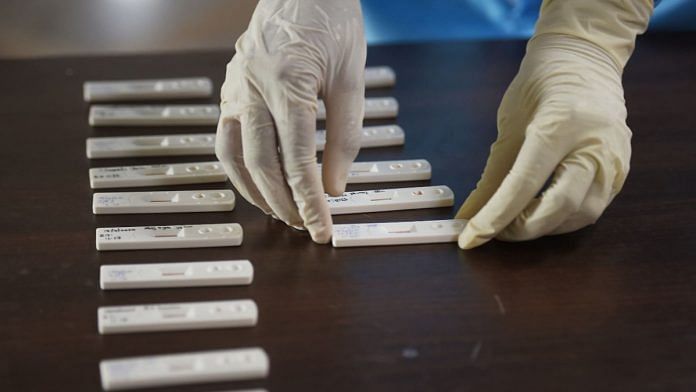New Delhi: Even as the global death toll of the novel coronavirus crosses 5 lakh, scientists around the world are gaining new insights into the SARS-CoV-2 pandemic and its treatment.
Here are some of the latest scientific developments on the Covid-19 front from across the world.
Web-like substance may cause blood clots in patients
A phenomenon in which infection-fighting cells emit a web-like substance to trap invading viruses as part of the immune response may lead to increased blood clotting, disease severity and death from Covid-19, research suggests.
Known, as NETosis, this part of the immune response becomes increasingly hyperactive in people on ventilators and people who eventually die of the disease, according to a study published in the journal, Blood. The study, led by a team from the University of Utah, reveals a potential mechanism for lung injury in Covid-19 that had not previously been reported.
As part of an immune response, white blood cells release web-like Neutrophil Extracellular Traps (NETs) to capture and kill pathogens. While typically beneficial, overactive NETs can clog blood vessels and lead to inflammatory tissue damage.
The team also found that a naturally occurring protein, found in umbilical cord blood, can dampen this NET immune response in laboratory experiments, paving the way for new therapies.
SARS-CoV-2 mechanism that hijacks proteins in cells identified
Scientists have cracked how the SARS-CoV-2 hijacks the proteins in its target cells, and have identified seven clinically approved drugs that could disrupt this mechanism, according to a study published in the journal, Cell. Their research shows how the virus shifts the cell’s activity to promote its own replication and to infect nearby cells.
The team analysed samples to evaluate all host and viral proteins that showed changes after SARS-CoV-2 infection. They found that 12 per cent of the proteins in the host cell that interact with the virus get modified.
The researchers also identified potential drugs that are most likely to regulate these modifications and stop the activity of the virus. Seven of these compounds, which are primarily used to fight cancer and inflammatory diseases, demonstrated potent antiviral activity in laboratory experiments.
Mobile network data may predict spots at risk of outbreak
Data from cellular wireless networks can help pinpoint potential hotspots of increased viral transmission, according to scientists who say this could prove to be a non-invasive strategy to identify areas at the greatest risk of Covid-19 spread.
The technique, described in the IEEE Open Journal of Engineering in Medicine and Biology, could help regions manage risks to avoid outbreaks in densely populated regions.
Since most people carry a mobile device, the method helps identify the most crowded areas, where asymptomatic carriers have a higher probability of coming into close contact with large numbers of healthy people.
Clinical trials to test if a natural protein can treat severe cases
Scientists in Ireland has begun a clinical trial to test if alpha-1-antitrypsin, a naturally occurring human protein produced by the liver, can help critically ill Covid-19 patients recover.
In a study published in the American Journal of Respiratory and Critical Care Medicine, researchers found that those who had severe form of Covid-19 had lower levels of an anti-inflammatory protein. The findings suggest that a therapy that augments the body’s inflammation-resolving mechanisms might have a positive impact.
Alpha-1-antitrypsin normally acts to protect the lungs from the destructive actions of common illnesses. It protects the airway from damage during acute pulmonary infection and is a potent anti-inflammatory protein that acts to protect the immune system.
The team has begun a clinical trial of alpha-1-antitrypsin to treat critically ill patients who are mechanically ventilated in the ICU due to Covid-associated Acute Respiratory Distress Syndrome.



